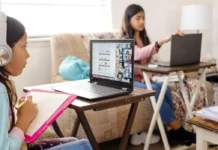
CBSE is one of the most sought-after boards in the education world, particularly the schools or colleges under CBSE are exceptional in their teaching skills. In this critical time, every institute in this world learns to provide quality education digitally. In other words, we can say CBSE, like other educational institutes, started delivering knowledge through online classes. Nowadays, the teachers who never faced the camera before are bound to teach by facing the webcam, which makes them feel weird, and thus they are learning to teach or train in online mode.
All schools and exams are banned for the serious pandemic situation, making all boards such as CBSE, ICSE, or state boards, running examinations in our nation, decide to conduct online classes. In that way, CBSE creates new guidelines to teach online as Institutes can’t stop the education of students due to any reason. So, here in this article, we’ll discuss some guidelines provided for online classes by CBSE and also some facilities.
Guidelines for Online classes- CBSE
However, the student needs to understand the CBSE guidelines announced by the HRD ministry for online training or teaching classes as they are very strict and very precise. Let’s have a closer view of the guidelines by CBSE online classes;
It was recommended that online classes for pre-primary students should not be more than 30 minutes.
For Classes 1 to 8, HRD has recommended conducting only two classes of 45-minute duration; however, in the case of 9th to 12th standard, there should be four online sessions having duration 30-45minutes each.
The online or digital learning must be obtained through eight steps such as plan, review, arrange, guide, talk, assign, track, and appreciate. In this way, students and online educators can quickly adapt to the step-by-step process of online learning and can perform well.
Various other factors such as cybersecurity, physical, mental and well-being, and ethical practices for taking precautions and measures for cyber safety should also be taken care of by students, parents, teachers administrators and school heads, according to the guidelines.
Balanced online and offline activities should be conducted, as the screen time is a crucial factor stated by the HRD ministry.
“Guidelines for physical health and mental wellness are stressed across the guidelines for all stakeholders’ measures so that children do not get overly stretched or stressed or negatively affected (postural defects, ophthalmic issues, and other physical problems) owing to prolonged use of digital devices. Also, it provides sufficient do’s and don’ts regarding ergonomics and cyber safety,” the official added.
Online books and study materials
CBSE Online classes expand the scope for students as all the books and study materials are said to be available online. Students can also record the lectures and watch them understand the topic later in a better way.
Note-taking and assignments are appreciated to submit at regular intervals as these are the critical factors for students’ academic life.
Besides them, the electronic modes of all school books are made available so that the student who doesn’t have the books and is unavailable to attend the school for study material can easily get access to those books digitally.
Doubt or concept clearing classes are also kept in the list, to provide complete school-like education at home.
Conclusion:
Every organization’s economic condition is not so good during the COVID-19 pandemic; thus, people become financially sufferer. For that reason, schools’ online education should not demand extra teaching costs from students, according to the guidelines. CBSE also provides various awareness and fitness training at a specific time through online classes.
After all, this is the future of students, which cannot be compromised due to circumstances, and also, the digital model of the study shows the way of innovative learning in the future.





